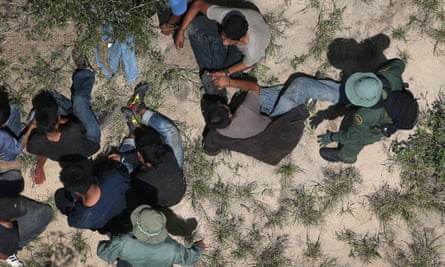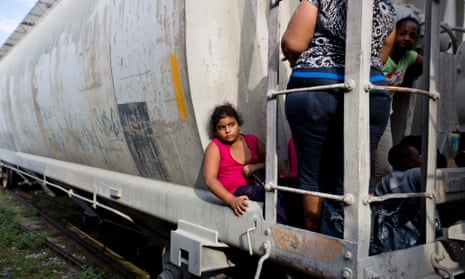As spring turned to summer, locals in the Texas border city of McAllen noticed a rise in the number of migrant women and children being dropped off at the bus station by immigration officials.
Churchgoers offered them food and clothes, but the flow of arrivals became so intense that it demanded a more formal response. In June, Catholic Charities of the Rio Grande Valley set up one shelter in a church hall near the bus station and another an hour’s drive away, in Brownsville.
Six weeks later they are still open and still busy. “We don’t know when an end is in sight,” said Brenda Riojas, a spokeswoman for the diocese. She said the McAllen location has served about 4,000 people, with the figures fluctuating from 30 to 40 in a day to as many as 200. Last week was “lower than what we’re used to,” she said, but “we’re jumping back into the hundreds this week.”
Catholic Charities was able to respond quickly to the crisis because of plans set up to handle events such as natural disasters, Riojas said. With mounds of clothes, bottles of water and medical equipment piled high on tables, and volunteers – as many as 600 – tending to the arrivals, the shelters provide families with essentials and a place to rest for a few hours. The families are released by officials after being processed and turn up with bus tickets to join up with relatives elsewhere in the country and envelopes containing notices to appear in immigration court.
Local city officials have helped with logistics and other services such as generators and an air-conditioned tent, Riojas said. A McAllen city spokesperson said that at current rates the city is expecting to spend $600,000 on helping humanitarian efforts through the end of the year.
The sums laid out by the federal government are rather higher as it attempts to handle the dramatic rise in unaccompanied children from central America who are crossing the border: more than 57,000 since last October, mostly into Texas. While politicians in Washington argue over how to handle the crisis, religious groups, non-profits and other private entities are dealing with it on a day-to-day basis, often tapping into federal funds.
Border Patrol hands the children into the care of the federal Administration for Children and Families (ACF), which has a $17bn annual budget and oversees a nationwide network of about 100 state-licensed shelters in which unaccompanied minors stay until they can be placed with a relative or other sponsor. The government is urgently looking for new buildings to house the influx, which has increased tenfold in three years, placing immense strain on the system.
Many shelters are run by non-profit groups such as San Antonio-based BCFS, formerly known as Baptist Child and Family Services, which is contracted to look after more than 2,000 unaccompanied minors in temporary facilities at military bases in Texas and Oklahoma.
In the 2010 fiscal year the ACF awarded BCFS about $10.6m in grants for work with unaccompanied children, according to a government grant-tracking website. So far this fiscal year the figure is about $280m, including one award of nearly $191m; BCFS is expanding its services and opening six regional offices.
BCFS tried to buy a hotel near McAllen this month, with the aim of converting it into a facility to house child migrants – a plan that was scuppered, it said, by a backlash arising from misinformation spread by conservative media.
Religious leaders toured a new Border Patrol holding centre in McAllen and the ACF facility at Joint Base San Antonio-Lackland on Tuesday.
“I think these children are being treated well, the larger story is of course the uncertainty in their lives about what they’re fleeing from and what they may be going back to,” said Russell Moore, president of the Southern Baptist Ethics and Religious Liberty Commission.
“I can think of few things more disgusting than those who would lash out in anger against vulnerable children who are fleeing for their lives. At the same time I’m very encouraged that the response of the American people and certainly the response of the American Christian community seems to be one of compassion and not of fear or anger.”
As well as urging compassion and seeking involvement in immediate and longer-term humanitarian efforts, some faith groups are aiming to wield their influence to bring about political change. The United States Conference of Catholic Bishops supports “comprehensive immigration reform”, including a path to citizenship for undocumented workers and other efforts to make it easier for migrants to live and work in the US.
It sent a delegation to central America last November to examine the increase in child migration and produce a report, months before the issue attracted widespread attention from politicians and media.
Moore is also a proponent of immigration reform. “We currently have an incoherent immigration system in this country,” he said.
“I think there’s one thing that Americans across the political spectrum can agree on, that the status quo is broken. I think what we’re dealing with is more than an immigration issue, this is chiefly a refugee crisis and a central American violence crisis. But it does remind us that we do have an immigration system in this country that is broken and beyond that we have a political system that is at a standstill on an entire host of issues.”

Kevin Farrell, the Catholic bishop of Dallas, told reporters this week that he is sceptical about the usefulness of Texas governor Rick Perry’s plan to send 1,000 National Guard troops to the border, in an attempt to boost security.
Faith and non-profit groups are also playing roles in helping migrants negotiate their way through the legal system. The Texas Catholic Conference issued a statement expressing concern that the government’s intention to speed up deportations “risks diminishing due process and mistakes on legitimate asylum claims”.
As well as asking for Target and Walmart gift cards to buy clothes and shoes, Catholic Charities of Dallas is seeking attorneys willing to help represent children in court.
A handful of pilot programmes in a few parts of the country aside, migrants are not entitled to public defenders in immigration court and often rely on pro bono legal representation. On 9 July the American Civil Liberties Union and other groups filed a class-action lawsuit against the federal government, for failing to provide legal help to children fighting deportation.
One of the plaintiffs is a 14-year-old girl from El Salvador who crossed the border in Texas in January and was released to join up with her Los Angeles-based father, Juan, after about a month in a shelter. She has an immigration hearing in September.
“It’s very complicated,” Juan, a 39-year-old truck driver, said through a translator. “It was so hard when I left and to be reunited is just an enormous joy … I’m so scared as I can’t afford an attorney and I’m worried she will get deported.”

Comments (…)
Sign in or create your Guardian account to join the discussion